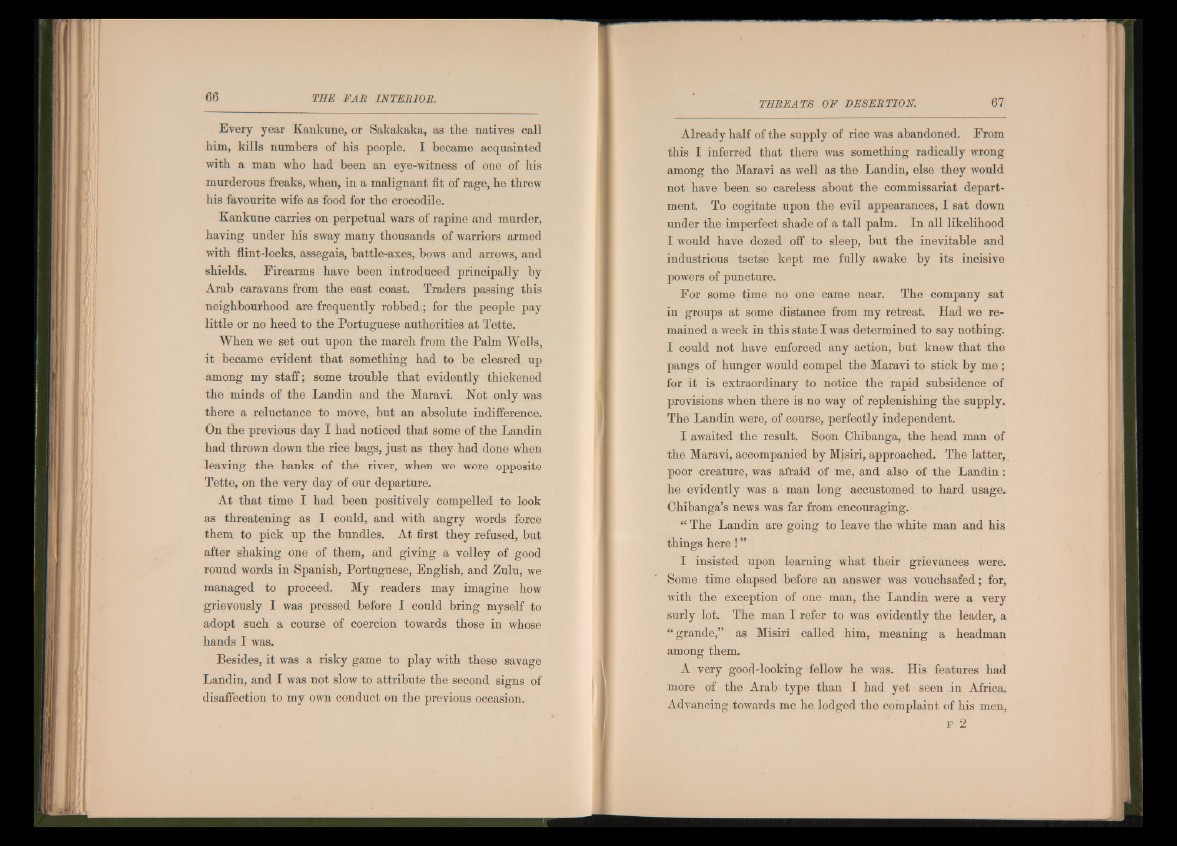
Every year Kankune, or Sakakaka, as the natives call
him, kills numbers of his people. I became acquainted
with a man who had been an eye-witness of one of his
murderous freaks, when, in a malignant fit of rage, he threw
his favourite wife as food for the crocodile.
Kankune carries on perpetual wars of rapine and murder,
having under his sway many thousands of warriors armed
with flint-locks, assegais, battle-axes, bows and arrows, and
shields. Firearms have been introduced principally by
Arab caravans from the east coast. Traders passing this
neighbourhood are frequently robbed; for the people pay
little or no heed to the Portuguese authorities at Tette.
When we set out upon the march from the Palm Wells,
it became evident that something had to be cleared up
among my staff; some trouble that evidently thickened
the minds of the Landin and the Maravi. Not only was
there a reluctance to move, but an absolute indifference.
On the previous day I had noticed that some of the Landin
had thrown down the rice bags, just as they had done when
leaving the banks of the river, when we were opposite
Tette, on the very day of our departure.
At that time I had been positively compelled to look
as threatening as I could, and with angry words force
them to pick up the bundles. At first they refused, but
after shaking one of them, and giving a volley of good
round words in Spanish, Portuguese, English, and Zulu, we
managed to proceed. My readers may imagine how
grievously I was pressed before I could bring myself to
adopt such a course of coercion towards those in whose
hands I was.
Besides, it was a risky game to play with these savage
Landin, and I was not slow to attribute the second signs of
disaffection to my own conduct on the previous occasion.
Already half of the supply of rice was abandoned. From
this I inferred that there was something radically wrong
among the Maravi as well as the Landin, else they would
not have been so careless about the commissariat department.
To cogitate upon the evil appearances, I sat down
under the imperfect shade of a tall palm. In all likelihood
I would have dozed off to sleep, but the inevitable and
industrious tsetse kept me fully awake by its incisive
powers of puncture.
For some time no one came near. The company sat
in groups at some distance from my retreat. Had we remained
a week in this state I was determined to say nothing.
I could not have enforced any action, but knew that the
pangs of hunger would compel the Maravi to stick by me ;
for it is extraordinary to notice the rapid subsidence of
provisions when there is no way of replenishing the supply.
The Landin were, of course, perfectly independent.
I awaited the result. Soon Chibanga, the head man of
the Maravi, accompanied by Misiri, approached. The latter,
poor creature, was afraid of me, and also of the Landin:
he evidently was a man long accustomed to hard usage.
Chibanga’s news was far from encouraging.
“ The Landin are going to leave the white man and his
things h e re ! ”
I insisted upon learning what their grievances were.
Some time elapsed before an answer was vouchsafed; for,
with the exception of one man, the Landin were a very
surly lot. The man I refer to was evidently the leader, a
“ grande,” as Misiri called him, meaning a headman
among them.
A very good-looking fellow he was. His features had
more of the Arab type than I had yet seen in Africa.
Advancing towards me he lodged the complaint of his men,
f 2